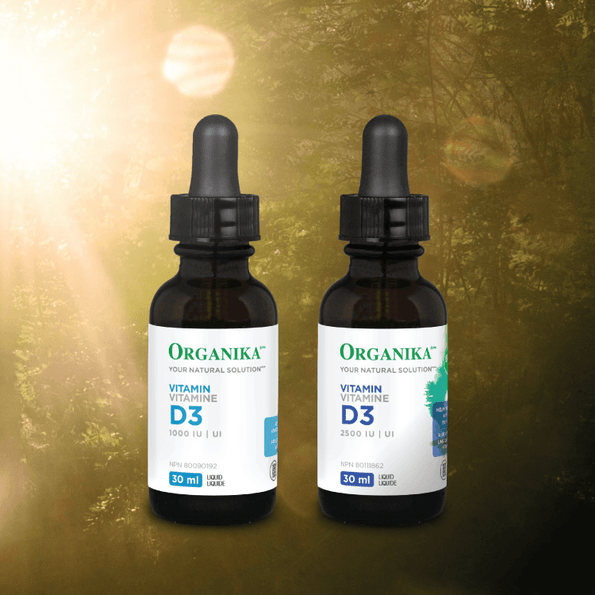Quick Dose
In the last decade or more, vitamin D deficiency is becoming more prevalent among Canadians. As more people avoid the sun for fear of premature aging and other health concerns, we find we are covering up our skin more than ever. The big question is what is vitamin D – the sunshine vitamin and are you getting enough?
In the last decade or more, vitamin D deficiency is becoming more prevalent among Canadians. As more people avoid the sun for fear of premature aging and other health concerns, we find we are covering up our skin more than ever, whether it be with clothing that blocks the sun or by applying layers of sunscreen every day. 70 – 90 % of North Americans do not get enough vitamin D daily, and this includes sunshine, food sources and supplements. We must test our vitamin D levels annually because if we are not getting it naturally, from the sun, we must supplement to keep healthy. The big question is what is vitamin D – the sunshine vitamin and are you getting enough?
Shop Vitamin D3
Vitamin D is a nutrient that the body needs in small amounts to stay healthy. Vitamin D combines with calcium and phosphorus to make strong bones and teeth. It is found naturally in foods such as oysters, liver, egg yolks, red meat, and oily fish. Like all fat-soluble vitamins, vitamin D is best absorbed with fats. Skin exposed to sunshine can also make vitamin D and it is the best source. 10-20 minutes per day between 10 am – 2 pm is the best way to safely absorb the sunshine. With under 20 minutes a day, skin won’t burn, and your body will naturally absorb the sunshine and you can manufacture vitamin D in the body. “We each have vitamin D receptor cells that, through a chain of reactions starting with conversion of cholesterol in the skin, produce vitamin D3 when they're exposed to ultraviolet B (UVB) from the sun,”
Some experts recommend avoiding the sun by seeking shade between 10am – 4pm or by wearing UV protective clothing and using sunscreen that is 30 SPF or higher. The problem with this is that it causes our absorption to go down. If we are not getting those 10-20 minutes of healthy sun exposure to naturally produce vitamin D in the body, it affects our health. In the summer our biggest surface area, the back and chest, can safely absorb the sun for under 20 minutes daily. Because we have phobias that the sun is aging us prematurely and causing other health concerns like cancer, we are lathering sunscreen on and affecting our natural absorption of vitamin D. Studies show that safe amounts of sun exposure help us to manufacture vitamin D naturally and it helps to prevent cancer. For longer periods in the sun, be sure to apply natural and chemical free sunscreens that will provide protection and keep you from burning.

What is surprising is that research done in northern California, which has more sunnier days than we do, found that the normal adult is deficient and 70-80% of the adults tested were deficient. We cannot know for sure where we are at without getting tested. In Canada, the normal range for vitamin D is between 75-250. The ideal range you want to be between is 125-175. You should be able to go into a lab and get your blood tested and get your results online the next day. Getting tested is important because it’s not just about exposure. It has to do with how you process it in your skin, liver, and kidneys. Recently, Health Canada increased the maximum amount of vitamin D supplements sold over the counter to 2,5000 IU for adults “As of February 24, 2021, Health Canada increased the maximum amount for vitamin D supplements sold over-the-counter to 2,500 IU per dose for adults. The previous maximum was set at 1,000 IU per adult dose” Health Canada increases non-prescription limit for Vitamin D. Genuine Wellness.
When supplementing with vitamin D, the best form of vitamin D is D3. Vitamin D2 is a synthetic form of vitamin D, and it is not absorbed well in the body. Vitamin D3 is naturally sourced from sheep lanolin. Wondering how much vitamin D should be given to children? The minimum is 400IU every day up until age one. Because vitamin D is a storing vitamin, you could give it daily or a few times a week at larger doses. Until we have the test to see where we are at, we stick with the recommended dose for children. For those of us living in Canada, because of our geographic location, the rays of the sun are too weak in the winter to generate the reaction that leads to the creation of vitamin D and supplementing with food and D3 supplement drops is a great way to keep your levels optimum to stay healthy.
Shop Vitamin D3
Article written by
Joleen Gruber, B.A, Registered Holistic Nutritionist
In the last decade or more, vitamin D deficiency is becoming more prevalent among Canadians. As more people avoid the sun for fear of premature aging and other health concerns, we find we are covering up our skin more than ever. The big question is what is vitamin D – the sunshine vitamin and are you getting enough?
Quick Dose
In the last decade or more, vitamin D deficiency is becoming more prevalent among Canadians. As more people avoid the sun for fear of premature aging and other health concerns, we find we are covering up our skin more than ever. The big question is what is vitamin D – the sunshine vitamin and are you getting enough?
Love learning about this stuff?
Get expert-backed health tips, education, product news, and exclusive offers delivered to your inbox.
